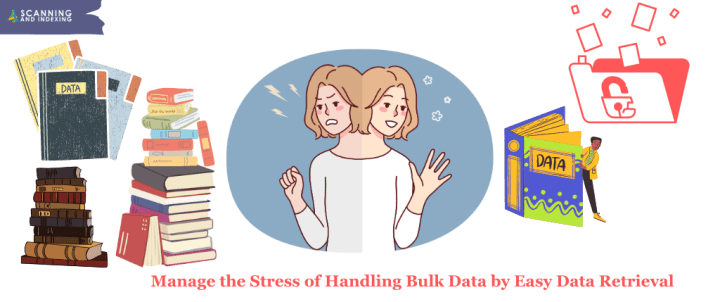Manage the Stress of Handling Bulk Data by Easy Data Retrieval
In the digital age, businesses and organizations are inundated with unprecedented data. Therefore, the ability to effectively handle and retrieve this bulk data has become a significant factor in maintaining efficiency and competitiveness. However, the sheer magnitude of data can lead to overwhelming stress for individuals and teams tasked with its handling. Now, in this blog, we explore how efficient data management and easy data retrieval can alleviate the stress associated with bulk data management. By implementing the right strategies and utilizing modern tools, businesses can streamline their operations, reduce stress, and maximize the benefits of their data resources.

Understanding the Challenge of Bulk Data Handling
The exponential growth of digital data has brought both opportunities and challenges. While data holds valuable insights that can inform decision-making and drive innovation, the sheer volume and complexity of data can lead to stress and inefficiencies. Businesses often need help to organize, store, and retrieve data when required effectively. This challenge becomes significantly pronounced when dealing with bulk data, such as customer records, transaction histories, and market trends.
The Role of Data Management in Stress Reduction
Efficient data management plays a pivotal role in reducing stress and improving the handling of bulk data. It incorporates various processes, including data collection, storage, organization, and retrieval. By establishing streamlined procedures, businesses can alleviate the stress that arises from data chaos and uncertainty.
- Structured Data Organization
One of the critical components of effective data management is structured organization. By Implementing a well-defined data categorization system, the data is easily searchable and accessible. These categories can be based on factors such as date, customer type, product category, or any other relevant parameter. This approach reduces the time and effort required to locate specific information, reducing stress and enhancing productivity.
- Centralized Data Repositories
Businesses often accumulate data across multiple platforms and departments. This decentralized approach can result in data silos that hinder collaboration and data retrieval. These data repositories can be centralized through integrated platforms or cloud-based solutions, as it allows easy access and updates. This consolidation reduces stress by providing a single source of truth for data, minimizing the risk of errors and duplicate entries.
- Easy Data Retrieval
Easy data retrieval is the linchpin of efficient data management. When employees can access the data promptly and effortlessly whenever they require it, the stress associated with data handling is significantly reduced. Here are some strategies to facilitate easy data retrieval:
- Searchable Metadata
Metadata, or descriptive information about data, plays a crucial role in data retrieval. Therefore, attach significant metadata such as keywords, tags, and descriptions to each dataset. This helps in enhancing the searchability of data, allowing users to locate the information they require quickly. The advanced search functionalities, combined with metadata, empower users to retrieve specific data points within a vast dataset without sifting through irrelevant information.
- User-Friendly Interfaces
Intuitive user interfaces enhance the data retrieval process. User-friendly dashboards and interfaces make it easier for employees to navigate and locate data. Implementing filters, sorting options, and customizable views further empowers users to access the exact data they need, reducing frustration and stress.
Tools for Efficient Data Retrieval
Modern technology offers a range of tools that can significantly enhance the process of data retrieval. These tools leverage automation, AI, and advanced algorithms to streamline bulk data handling and alleviate stress.
- Data Management Software
Dedicated data management software provides a comprehensive solution for organizing and retrieving bulk data. These tools often include features like automated data entry, customizable dashboards, and robust search capabilities. Such software eliminates manual tasks and reduces the risk of errors, contributing to stress reduction.
- Artificial Intelligence and Machine Learning
AI and machine learning algorithms can be harnessed to predict data retrieval patterns and suggest relevant data points based on user behavior. These technologies can learn from user interactions and adapt to provide more accurate and timely results over time.
In today’s data-driven landscape, effective data management and easy data retrieval are integral to business success. The challenges of handling bulk data can lead to stress and inefficiency, hampering productivity and decision-making. By implementing structured data organization, centralized repositories, and embracing user-friendly interfaces, businesses can significantly reduce the stress associated with data handling. Additionally, leveraging advanced tools such as data management software and AI-driven solutions further enhances the ease of data retrieval.
Incorporating these strategies and technologies not only reduces stress but also empowers businesses to unlock the full potential of their data. As the volume of data continues to grow, the ability to manage and retrieve data efficiently will become even more critical. By prioritizing stress reduction and efficient data handling, businesses can stay competitive, make informed decisions, and propel themselves toward a future defined by data-driven success. Connect with us at [email protected] to know more.





